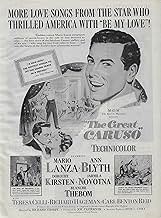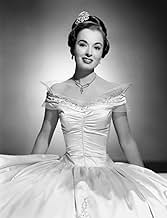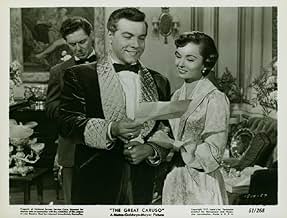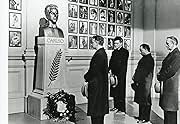Ajouter une intrigue dans votre langueThe film explores the life of tenor Enrico Caruso, a vocalist who faces rejection from Musetta and Dorothy, and struggles to find acceptance in New York.The film explores the life of tenor Enrico Caruso, a vocalist who faces rejection from Musetta and Dorothy, and struggles to find acceptance in New York.The film explores the life of tenor Enrico Caruso, a vocalist who faces rejection from Musetta and Dorothy, and struggles to find acceptance in New York.
- Réalisation
- Scénario
- Casting principal
- Récompensé par 1 Oscar
- 4 victoires et 6 nominations au total
- Antonio Scotti
- (as Paul Javor)
- Caruso (as boy)
- (as Peter Edward Price)
Avis à la une
Lanza's rich lyrical tenor is given a showcase in which to perform both Neapolitan songs and operatic arias and he doesn't disappoint. Casting him as Caruso was a shrewd and clever decision--but the letdown comes in the fictionalized story that bears little resemblance to the true background of the singer. Artificial touches abound--including Ann Blythe as his wife. Nevertheless, since enjoyment of the film depends entirely on whether or not you enjoy the singing talent of Mario Lanza (and his limited acting abilities), you should find this biography a lightweight treatment of Caruso's life--although highly incomplete and sometimes even inaccurate. Perhaps some day there will be a true biography of the singer.
If nothing else, should compel some viewers to explore Caruso's life for the real story. Incidentally, there is a new song, "The Loveliest Night of the Year", which rates utmost respect. The soundtrack is great to listen to--Lanza was in the best of voice at the time of recordings.
Flaws aside, The Great Caruso is still a very good film. For starters it is gorgeous to watch. The costumes, sets and cinematography are absolutely amazing and just a feast to the eyes. Even better is the music, the music is like a treasure trove of some of the greatest tenor arias ever written. We have La Donna E Mobile from Rigoletto, Celeste Aida from Aida and Vesti La Giubba from Pagliacci, not to mention the charming The Loveliest Night of the Year beautifully sung by Ann Blyth.
I have little to complain about the performances either. Ann Blyth, Dorothy Kirsten(an underrated singer), Alan Napier, Paul Javor and Jarmila Novotna are all wonderful. I have yet to talk about the best performance, it is easy enough to say that Mario Lanza gave the best performance but vocally and acting-wise. How do you like that? A singing legend portraying another? Lanza is absolutely brilliant, he is in fine voice and wholly believable here, it is such a shame his career was cut so short. You may argue that Caruso and Lanza sound familiar in voice, personally I don't think they do. Whereas Lanza had a rich lyrical voice, Caruso's was somewhat darker and perhaps more dramatic. There is nothing wrong with that, both had naturally beautiful voices that sing all those arias with effortless ease.
Overall, flawed, but well worth seeing for the music and Mario Lanza. You may be disappointed if you are looking for a true historical music lesson, but if you want a biopic with gorgeous visuals and music I think you have met your match in The Great Caruso. 7/10 Bethany Cox
Let's be honest from the outset: the movie bears little resemblance to the real Caruso's life, and, yes, it is corny in the grand tradition of Hollywood musicals. But who cares? Lanza's singing is perfection itself, and his vibrant personality overflows in practically every scene. The rest of the cast is good, with top-notch operatic singers Blanche Thebom, Giuseppe Valdengo, et al providing Lanza with some worthy (and rare) vocal support.
Highlights include a superb Vesti la Giubba, a moving Ave Maria and a rapturous Because. In all the movie contains 27 vocal items, with not a dull moment to be found amongst them.
See this movie and revel in a unique vocal talent. In the words of one admirer, Mario Lanza could "outsing the entire Mormon Tabernacle Choir", and the movie is a stark reminder of how bland today's singing idols really are. Enrico Caruso, Jr, was one observer who concurred with this view.While the movie overlooked his existence in favor of his half-sister Gloria, Caruso's son had nothing but praise for the man who portrayed his father:
"Mario Lanza was born with one of the dozen or so great tenor voices of the century, with a natural gift for placement, an unmistakable and very pleasing timbre, and a nearly infallible musical instinct conspicuously absent in the overwhelming majority of so-called 'great' singers. His diction was flawless, matched only by the superb Giuseppe di Stefano. His delivery was impassioned, his phrasing manly, and his tempi instinctively right -- qualities that few singers are born with and others can never attain.
"I can think of no other tenor, before or since Mario Lanza, who could have risen with comparable success to the challenge of playing Caruso in a screen biography."
Well said, Enrico Jnr, and viva il grande Lanza!
Le saviez-vous
- AnecdotesThis was the next-to-last completed MGM film under Louis B. Mayer's supervision (the last was Show Boat (1951), released in the summer of that year). A proxy fight soon after would see him removed as the head of the studio he helped to found. He was replaced by his former chief of production, Dore Schary. Mayer ran MGM for 27 years, Schary for barely 6.
- GaffesOpening credits: The events, characters and firms depicted in this photoplay are fictitious. Any similarity to actual persons, living or dead, or to actual firms is purely coincidental. Says it ALL.
- Citations
Enrico Caruso: It is true, Señor Barretto, that right now I sing for pennies. Pennies are not very important in a big house like this. But the singing, that is important everywhere. It makes people feel good inside, takes away the ugliness, the sadness, and it fills the empty place here. That too is something Señor, isn't it?
- Crédits fousOpening credits: The events, characters and firms depicted in this photoplay are fictitious. Any similarity to actual persons, living or dead, or to actual firms is purely coincidental.
- ConnexionsFeatured in The Metro-Goldwyn-Mayer Story (1951)
- Bandes originalesThe Loveliest Night of the Year
Lyrics by Paul Francis Webster
Music adaptation by Irving Aaronson
Also performed by Ann Blyth (uncredited)
Adapted from "Sobre las olas" (uncredited)
Music by Juventino Rosas
Meilleurs choix
- How long is The Great Caruso?Alimenté par Alexa
Détails
- Date de sortie
- Pays d’origine
- Langues
- Aussi connu sous le nom de
- El gran Caruso
- Lieux de tournage
- Metro-Goldwyn-Mayer Studios - 10202 W. Washington Blvd., Culver City, Californie, États-Unis(studio: made in Hollywood, U.S.A.)
- Société de production
- Voir plus de crédits d'entreprise sur IMDbPro
- Durée1 heure 49 minutes
- Rapport de forme
- 1.37 : 1
Contribuer à cette page
























